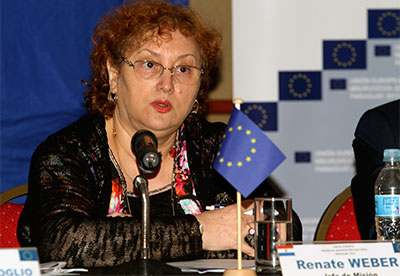The European Parliament, meeting in a plenary session in Strasbourg, France, adopted today a resolution stating that “changes in EU member state’s media laws that make it easier for governments to interfere in the media should be monitored every year at EU level.”
Based on a report drafted by liberal Romanian MEP Renate Weber, the resolution was adopted by 539 votes to 70, with 78 abstentions.
The resolution comes as the gap is widening between model EU countries and those with poor press freedom records. In particular, the EU has shown it does not know how to manage Hungary, a member state that has been regularly criticized by the European Commission and at the European Parliament for its seriously flawed media law.
Weber’s report reflects a certain European idea of press freedom. Besides referring to the conventional articles in international and European law enshrining freedom of expression and freedom of the press, it emphasizes a number of issues that characterize and dominate the European debate: the role of public service media, media pluralism, and journalists’ independence from both internal and external pressures.
Despite the wave of privatization initiated in the 1980s, public service broadcasting remains a mainstay of the European media landscape. The report, which recalls the “important role of the public service media and their institutional duties to provide high quality and accurate and reliable information,” warns however these values and principles–independence, pluralism, and impartiality–are at risk. In many former Eastern European countries but also, to a lesser extent, in old Europe, ruling parties tend to consider these public service media as their own.
The report therefore calls for “the devising of procedures and mechanisms for the selection and appointment of media heads, management boards, media councils, and regulatory bodies that are transparent, based on merit and indisputable experience, and integrity, instead of political or partisan criteria in the framework of a spoil system linked to the results of elections or the will of those in power.”
Media pluralism is also hailed as “a pillar of media freedom in terms of ensuring that media (…) offer a wide range of views.” Highlighting the dangers of media concentration, it also pleads for transparency in ownership and management, an issue that is particularly acute in some former Communist countries where businessmen with dubious records own influential mass media and dictate their editorial line.
In order to counter such unsavory intrusions into the media, the report underlines “the importance of ensuring the independence of journalists both from internal pressures from editors or owners and externally from political or economic lobbies or other interest groups.”
In its efforts to promote public interest and ethical journalism, the EU is at times suspected of being intent on over-regulation. Such accusations often come from anti-European circles, particularly in the U.K., but vigilance is well-advised: in January, for instance, the report of the High Level Group on media freedom and pluralism convened by Neelie Kroes, EU Commissioner for the Digital Agenda, gave Eurobashers an axe to grind by suggesting EU-wide statutory self-regulation.
Weber’s recommendations are much more subtle. She proposes that the European Commission “should organize the monitoring of media freedom in the EU on a yearly basis” and “institutionalize EU-level cooperation and coordination on the media,” especially for audiovisual media. The resolution also insists that “media regulatory bodies should always be independent and created by the media sector itself.”
Hungary has been for the past two years the elephant in the room in these parliamentary discussions on press freedom. Weber’s report makes an indirect reference to the controversy, which is seen as a litmus test of the legal prerogatives and the political will of the Commission–the official guardian of EU values as defined in the union’s treaties, and in particular the most recent, the 2007 Lisbon Treaty, which purported to clarify what powers belong to the EU, the member states, or are shared. “The treaties provide the EU with a mandate and powers to ensure that fundamental rights are protected in the EU,” the report says, even though some EU law experts beg to disagree and consider this reference to the EU powers as a an excessively liberal interpretation of the treaties.
However, in a Parliament dominated by the European People’s Party (EPP)–a center-right group that hosts Italian media mogul Silvio Berlusconi and Hungarian Prime Minister Viktor Orban–it is very unlikely that the proposal of the Liberal group’s president, former Belgian Prime Minister Guy Verhofstadt, to activate Article 7 of the Lisbon Treaty (suspending a member state’s voting rights) will find a majority soon.
The European Parliament can be forceful in defending lofty principles, but it can turn wooly-kneed when it has to take concrete measures that might adversely impact its most powerful members.
[Reporting from Brussels]
